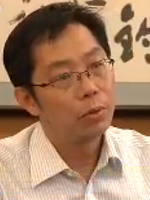The overuse of antibiotics is one of the greatest threats facing the pharmaceutical, farming and medical industries. Overuse or abuse of the drugs has led to increasing resistance and given rise to "superbugs" that threaten patients and the world's food supply.
The threat is especially acute in poorer, developing countries where antibiotics are routinely overprescribed or given without a prescription. Experts gathered in Berlin for the World Health Summit will hear, however, that a plan in China to control the use of antibiotics has shown positive results, at least for one kind of superbug, according to a report by CNTV.
Data cited by CNTV showed that rates of infection by the MRSA superbug, which is a staph infection resistant to multiple antibiotics, decreased.
 |
| Professor Zheng Bo--Courtesy CNTV |
"The rates of staph bacteria that are antibiotic-resistant dropped from 70% to 30% or 40% in many hospitals in China, thanks to the strict control in antibiotics usage in recent years," said Professor Zheng Bo, regional director of China Antimicrobial Resistance Monitoring System, in the CNTV article.
Part of those new controls include requiring prescriptions--at least in big cities--and doctors are also being required to cut down on the use of the drugs. At Peking University First Hospital, antibiotic use for outpatients has dropped by 50% since 2006, according to the CNTV report.
But Professor Zheng says there are still other threats in China and not just for the medical industry.
"It's widely known that the animals we eat are fed antibiotics. When the food chain has antibiotics, bacteria in the environment could develop resistance and infect humans," Professor Zheng said in the CNTV report.
A recent study by the Chinese Academy of Sciences showed just how prevalent antibiotics remain in the mainland's environment, according to a report by the South China Morning Post (SCMP).
The study focused on 36 kinds of the most common antibiotics showed in 2013 that 53,800 tons entered the environment and were still there even after being treated by wastewater treatment plants, the SCMP reported, with concentrations highest in waterways around Beijing, Tianjin and Hebei provinces, where the population is dense and rainfall scarce, the SCMP said.
"The usage of antibiotics in China is very high, it's almost half of the world usage when we compare it with international studies," said Ying Guangguo of the Guangzhou Institute of Geochemistry under the Chinese Academy of Sciences, and who led the research, according to the SCMP report.
The newspaper also cited another study published last year by researchers at Princeton University that showed global use of antibiotics between 2000 and 2010 rose 36% with Brazil, Russia, India, China and South Africa responsible for more than 75% of the increase, the SCMP reported. It also found that by 2010, China was the second-largest consumer of antibiotics after India.
- here's the story by CNTV
- and one from the SCMP